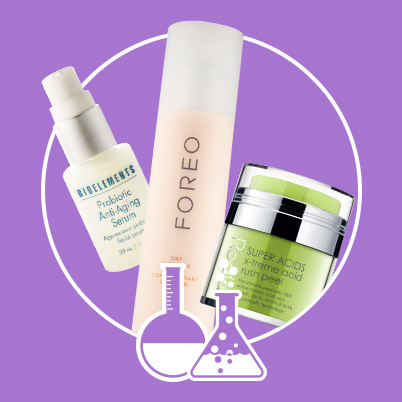Essentially, everything we're exposed to or put into our bodies can impact our bacteria. "Some of the most common offenders in destroying this good bacteria are antibiotics, steroids, processed foods, birth control pills, coffee, carbonated beverages, ascorbic acid, additives and preservatives, radiation, chlorine, fluoride, pesticides, herbicides, fertilizers and stress," explains Sherry Ross, M.D., OB/GYN and women's health expert at Providence Saint John's Health Center in Santa Monica, California.
To put it simply, we will always have an ebb and flow of good and bad bacteria in our systems, which is why it's so important to load up on healthy bacteria to help kill off the unhealthy bacteria. As the gut and skin are intimately related, Garden points out that this microbiome can affect the bacteria that lives on our skin as well.
In an effort to gain more "good gut bacteria," many doctors recommend probiotic supplements. "These supplements work by providing your gut with large amounts of bacteria that are typically found in high numbers in the guts of healthy people," explains Garden. Essentially, by consuming live bacteria, you are providing your intestines with the manpower to crowd out the unhealthy bacteria.
To put it simply, we will always have an ebb and flow of good and bad bacteria in our systems, which is why it's so important to load up on healthy bacteria to help kill off the unhealthy bacteria. As the gut and skin are intimately related, Garden points out that this microbiome can affect the bacteria that lives on our skin as well.
In an effort to gain more "good gut bacteria," many doctors recommend probiotic supplements. "These supplements work by providing your gut with large amounts of bacteria that are typically found in high numbers in the guts of healthy people," explains Garden. Essentially, by consuming live bacteria, you are providing your intestines with the manpower to crowd out the unhealthy bacteria.
So how do our guts influence what's happening on our skin? Recent studies have examined probiotics' impact on specific skin conditions, including acne, psoriasis, rosacea and eczema. "This is a game-changer, as it can appear that your gut flora can moderate what is going on in your skin," says Angela Lamb, M.D., New York City-based dermatologist.
When it comes to the biggest skin offender, acne, studies indicate that taking probiotics in addition to following standard acne treatments can lead to clearer skin. Other research has linked probiotic supplements to a reduction in eczema outbreaks in both adult women and young babies, and a 2008 study showed that patients with rosacea had a greater incidence of having altered gut bacteria flora compared to healthy control patients. "Additionally, there have been some small studies examining oral, and even topical, probiotics showing improvement in mild rosacea," says Dr. Garden.
We may even have probiotics to thank for reducing the appearance of tricky-to-treat sun spots, as probiotic-infused gels are being studied as a way to help chronic ulcers and skin burns. "The theory is that probiotics help normalize the disruptions in the microbiome of the wound, as unhealthy bacteria colonize wounds and inhibit the formation of healthy new skin," Garden explains.
While he admits that these studies are small, they are promising. "As long as patients run it by their doctors first, probiotics, whether as a supplement or increasing it through their diet, can potentially be a beneficial addition to one's skin routine."
When it comes to the biggest skin offender, acne, studies indicate that taking probiotics in addition to following standard acne treatments can lead to clearer skin. Other research has linked probiotic supplements to a reduction in eczema outbreaks in both adult women and young babies, and a 2008 study showed that patients with rosacea had a greater incidence of having altered gut bacteria flora compared to healthy control patients. "Additionally, there have been some small studies examining oral, and even topical, probiotics showing improvement in mild rosacea," says Dr. Garden.
We may even have probiotics to thank for reducing the appearance of tricky-to-treat sun spots, as probiotic-infused gels are being studied as a way to help chronic ulcers and skin burns. "The theory is that probiotics help normalize the disruptions in the microbiome of the wound, as unhealthy bacteria colonize wounds and inhibit the formation of healthy new skin," Garden explains.
While he admits that these studies are small, they are promising. "As long as patients run it by their doctors first, probiotics, whether as a supplement or increasing it through their diet, can potentially be a beneficial addition to one's skin routine."
Even if you're already sold on probiotics' skin benefits, the many, many options in your local health food store may leave you frozen in your tracks.
"Since the effects of individual bacteria strains vary, the first thing to consider when choosing a probiotic supplement is the reason you are taking it," says Rudolph Bedford, M.D., gastroenterologist at Providence Saint John's Health Center in Santa Monica, California. This can help you determine what cause you're trying to treat.
If a pristine complexion is your goal, the most researched probiotic strain that's been linked to skin health is lactobacillus acidophilus. Others to try? Bedford notes that L. Rhamnosus has been known to help eczema and L.Plantarum has been linked to reduction in inflammation, which can also impact the skin.
Since most probiotics in the U.S. are sold as dietary supplements, they do not undergo the same rigorous testing and approval process as other drugs and medications. For this reason, experts urge consumers to be careful when selecting a probiotic supplement.
"Be sure the ingredients are clearly marked on the label and familiar to you or your health provider," says Bedford. It's also important to check expiration dates to make sure the bacteria is live and look for "CFUs," or colony forming units in the billions so you know you're getting an effective amount. "A good brand specifies the amount of live organisms and lists the exact strains used in their formula," he adds.
The label should specify that the living microbes are viable through end of shelf life or "best by" date rather than at time of manufacture to ensure the bacteria are still live when you take them and able to reach your colon. "Quality trumps everything. Supplements that are a bargain are typically not of quality."
"Since the effects of individual bacteria strains vary, the first thing to consider when choosing a probiotic supplement is the reason you are taking it," says Rudolph Bedford, M.D., gastroenterologist at Providence Saint John's Health Center in Santa Monica, California. This can help you determine what cause you're trying to treat.
If a pristine complexion is your goal, the most researched probiotic strain that's been linked to skin health is lactobacillus acidophilus. Others to try? Bedford notes that L. Rhamnosus has been known to help eczema and L.Plantarum has been linked to reduction in inflammation, which can also impact the skin.
Since most probiotics in the U.S. are sold as dietary supplements, they do not undergo the same rigorous testing and approval process as other drugs and medications. For this reason, experts urge consumers to be careful when selecting a probiotic supplement.
"Be sure the ingredients are clearly marked on the label and familiar to you or your health provider," says Bedford. It's also important to check expiration dates to make sure the bacteria is live and look for "CFUs," or colony forming units in the billions so you know you're getting an effective amount. "A good brand specifies the amount of live organisms and lists the exact strains used in their formula," he adds.
The label should specify that the living microbes are viable through end of shelf life or "best by" date rather than at time of manufacture to ensure the bacteria are still live when you take them and able to reach your colon. "Quality trumps everything. Supplements that are a bargain are typically not of quality."
Though probiotic supplements contain significantly higher amounts of particular strains of bacteria than food, you can get your fair share of probiotics from certain food sources too. In fact, most large studies and meta-analyses do not seem to support the idea that supplements are better than foods that contain probiotics. "Eating foods such as yogurt and sauerkraut should be enough for otherwise healthy people," says Garden.
First thing first: Eat more sour foods. Sour foods might not sound like the most mouth-watering meal addition, but hear us out. Fermented eats, like sauerkraut, kimchi, pickles and kombucha, all contain some probiotics. Apple cider vinegar is another great source of probiotics. You can incorporate it easily in everything from your salad dressings to dips and even soups. Certain dairy products, like yogurt (especially kinds derived from goat's milk) and kefir, and certain types of cheeses, including gouda, mozzarella, cottage cheese and cheddar, contain probiotics.
Another benefit to filling your plate with probiotics? You won't have to remember to take yet another daily supplement.
First thing first: Eat more sour foods. Sour foods might not sound like the most mouth-watering meal addition, but hear us out. Fermented eats, like sauerkraut, kimchi, pickles and kombucha, all contain some probiotics. Apple cider vinegar is another great source of probiotics. You can incorporate it easily in everything from your salad dressings to dips and even soups. Certain dairy products, like yogurt (especially kinds derived from goat's milk) and kefir, and certain types of cheeses, including gouda, mozzarella, cottage cheese and cheddar, contain probiotics.
Another benefit to filling your plate with probiotics? You won't have to remember to take yet another daily supplement.





